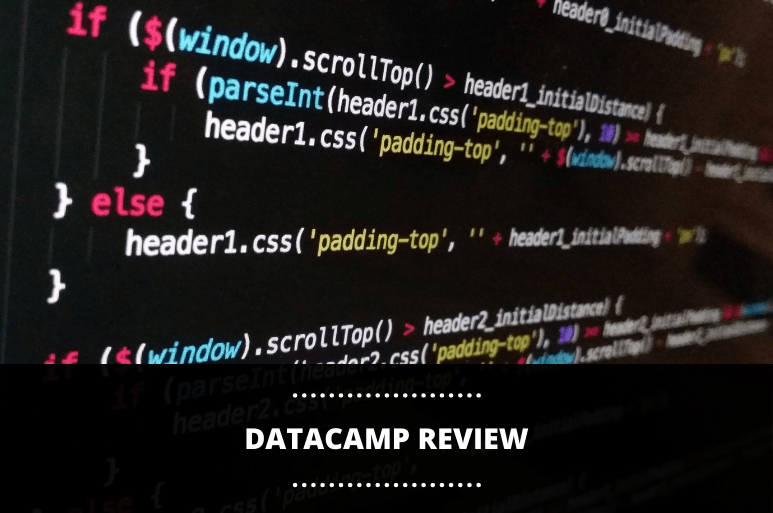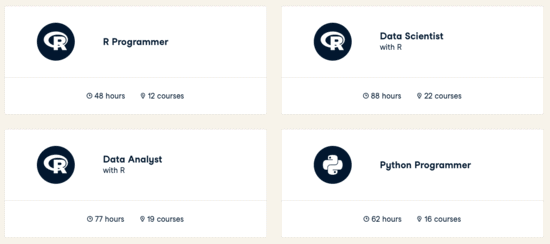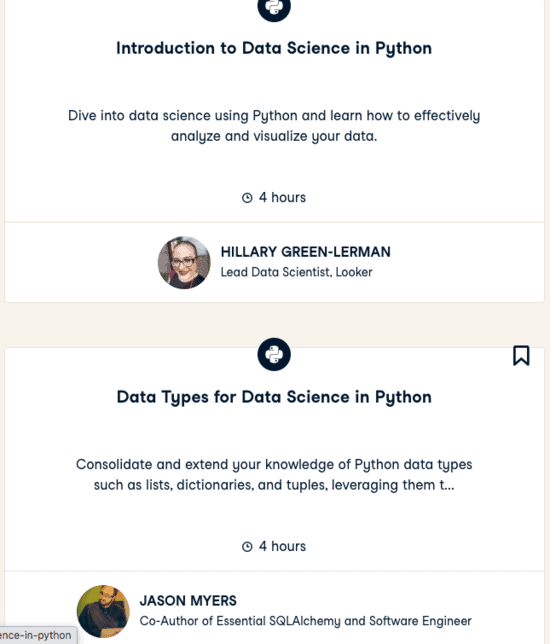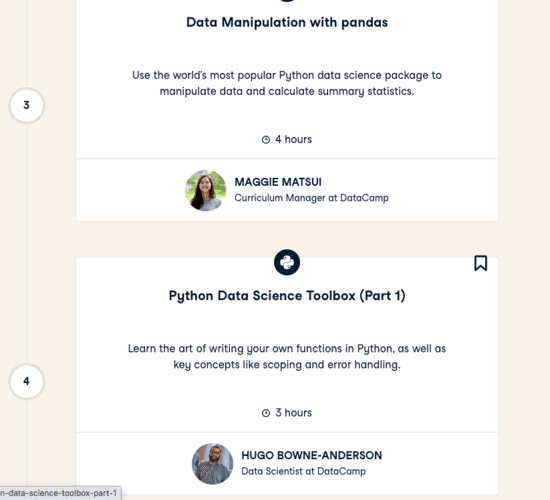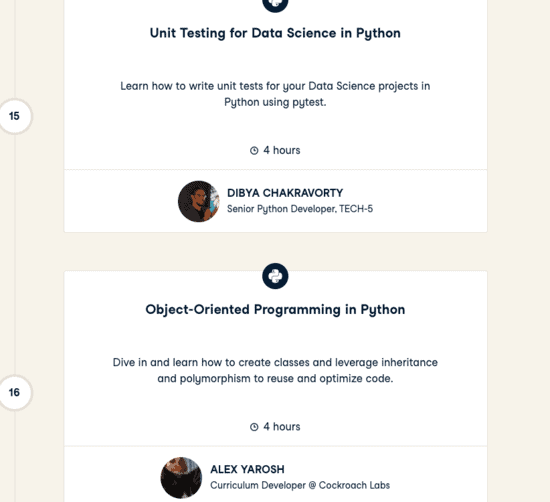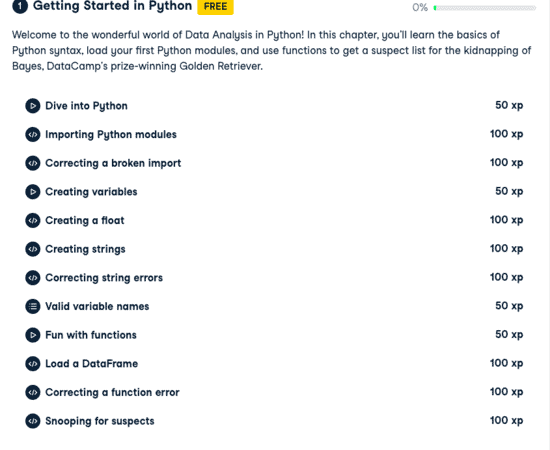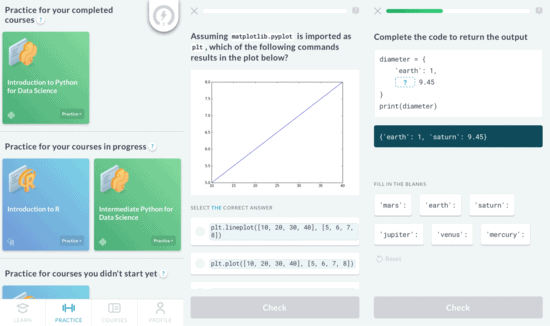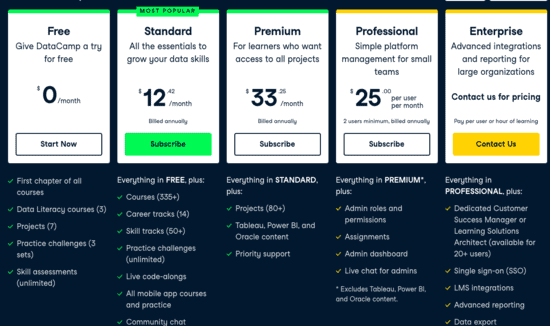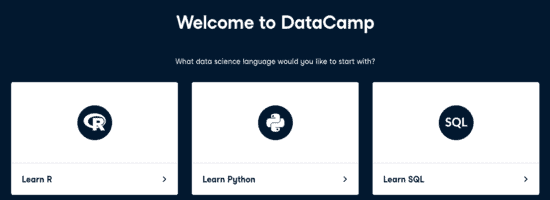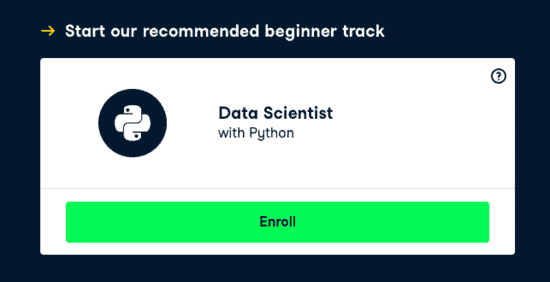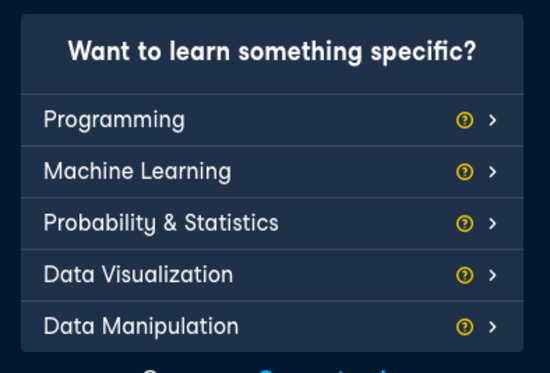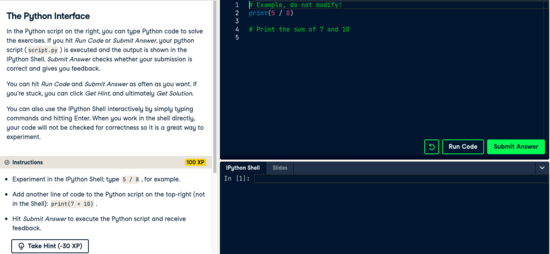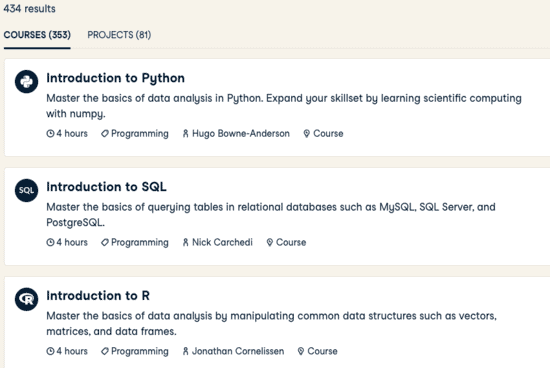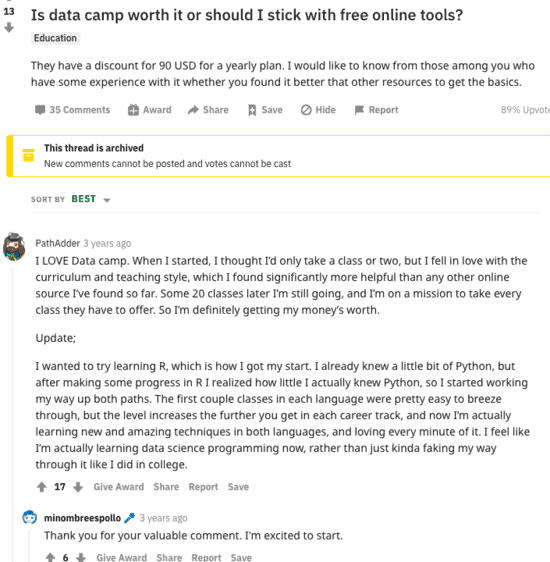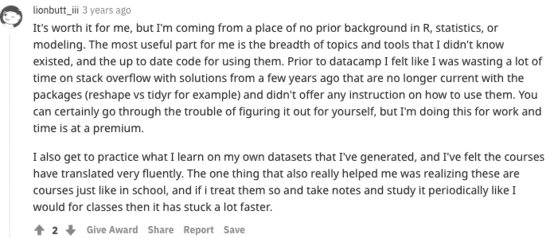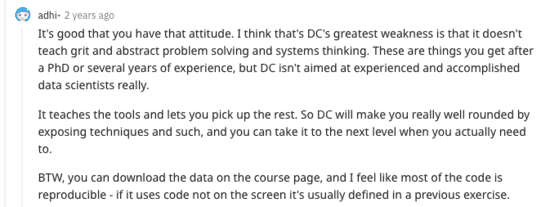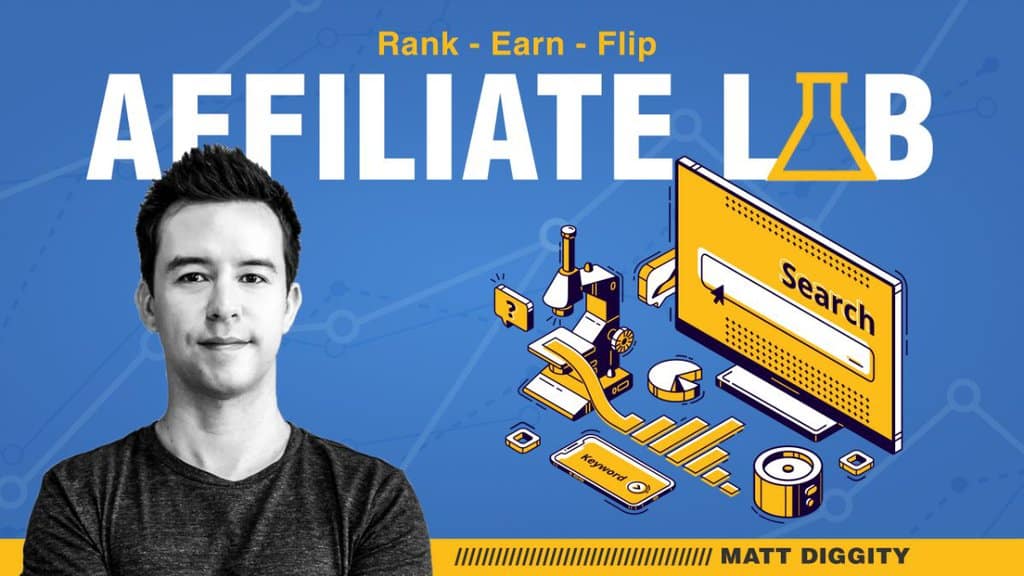Welcome to my DataCamp review, recently updated for 2024.
You've probably seen the ads for Datacamp all over the place… I get bombared on YouTube daily.
Deciding whether or not to subscribe to DataCamp is super easy. You just need to know exactly what to expect and see if that matches up with your career goals.
I really don’t understand why there’s so much arguing and confusion over this platform.
It’s great for what it does and pretty “meh” for everything else. If you go in with the right expectations, you’ll get way more value than you pay for.
In this review, I’ll tell you everything you need to know.
Including:
- What it is and what it IS NOT
- Who it’s for and not for
- Pros and cons
- A sneak peek inside so you know what you’re getting into
- The best features
- Some features that really piss me off
- The number 1 reason why I think DataCamp is a great deal even if it’s flawed
NOTE: Pretty much every review I found had outdated pricing (from 2021) and didn’t include new courses. I have no idea why people don’t update their stuff AT LEAST YEARLY. It’s not that hard. My pricing is accurate as of 2024.
Pros
- Digestible and easy to follow
- Great UX
- The cheapest way to break into the business
- Data science made easy
- No hidden fees
- Go from 0 to confident in Python, SQL, and R faster than other methods
- Courses led by expert instructors
- The FREE plan is fine for assessment and doing some projects
Cons
- No degree or certificate
- A lot of text
- Little applicable theory
- Some of the material is hit or miss
- The FREE plan is pretty much useless for learning new skills
Will DataCamp Make Me a Badass Millionaire Data Scientist in Silicon Valley?
I just want to set the record straight immediately, since this is where most of the negative feedback originates.
NO, DataCamp will not land magically you a six-figure gig in the Bay Area (still under the poverty line in San Fran!). If you want to be a data analyst, machine learning engineer, or any of the other fancy gigs out there, you’ll need more than DataCamp.
They issue no certification or degree (a big drawback in my opinion). And you won’t learn the in-depth theory or problem-solving skills necessary for high-paying gigs at Google, Facebook, or any of the other evil… I mean world-leading names in the tech industry.
DataCamp is an awesome way to gain skills and practice until you’ve mastered them.
It’s a user-friendly and affordable way to learn the foundational skills of data science. Use it for learning the basics, getting hands-on experience, and practicing for cheap, but NOT for your resume (CV).
DataCamp is Great for…
Think of DataCamp as a boot camp/crash course for learning data science.
Rather than plunge head-on into a $25,000/year masters program, DataCamp lets you :
- Test if you even enjoy data science
- Learn bedrock skills that you’ll need in any data science job
- Get hands-on, real-world practice for next to nothing
- Meet and network with students and instructors
- Learn valuable skills
And all for pretty cheap.
It’s great for:
1. Helping to Land a Job in Data Science
DataCamp is a great way to start your journey toward a career in data science. It’s just one tool that you’ll use along the way. If you grind through DataCamp's coursework on Python, R, or SQL, you’ll be way ahead of the curve, which may help you land a job or get a promotion at work. It won’t accomplish that alone though.
2. Getting a High-Level Introductory Understanding of the Subjects
You’ll learn a lot of valuable information that you can then build on with other materials like books, courses, online communities like Kaggle, training programs, etc. It gives you the tools and you choose how you pick up the rest.
You can go from, “What the hell is this stuff?” to “I’m 100% confident I can program in Python,” and that’s pretty awesome considering it costs a few hundred bucks for a year.
3. Getting High-Quality Data Science Practice on the Cheap
“Cheap” data science courses go for $15,000 easily. For reference, one of the “cheap” Coursera data science programs could cost up to $17,000.
For a few hundred bucks a year, you learn key data skills and infinite opportunities to practice them on real-world projects or on your own in practice mode (daily practice challenges). So, say you already have a job and just want to get better at new skills. Boom! Here’s a cheap way to do it.
That’s one thing most students like about DataCamp—it starts off by holding your hand then slowly takes the training wheels off, making you write the whole thing (some courses do this better than others).
4. Upskilling for Your Current Job or Upskilling Entire Teams
I think if Google, PayPal, Uber, and Deloitte use something for their teams, then it shouldn’t matter what I say. But I’ll say it anyway.
There’s a reason 80% of the Fortune 1,000 use DataCamp for their teams.
Say you have dinosaur legacy tools and need to teach your team Python, SQL, or R, for as little as $50 a month ($25/month per user) your employees can learn, practice, and apply key skills that move your organization forward.
It’s way better than paying for them to get a master’s. This might be the best thing about DataCamp. It’s a cheap, fast way to teach teams key skills in SpreadSheets, Excel, Python, and SQL so they can start applying them to your company in a few weeks or less.
On an individual level, it’s great for learning new skills and advancing a career inside your current company. The review section is rife with students who’ve learned data science skills and advanced into higher-paying positions.
5. Hand-Holding for New Data Scientists
I know hand-holding sounds bad, but I don’t mean it that way.
DataCamp is great for people new to the field who need to be walked step-by-step through data science theory, skills, and careers.
Career Tracks is a game-changer. It’s a collection of courses designed to give you the skills needed to get a job in that field.
Say you want to be an R programmer. You just select that from the career menu, and DC puts you through a selection of different lessons from multiple courses that will give you all the skills needed to get a job in that field. That way, you don’t have to mix and match or waste time playing the guessing game.
You won’t be able to jump right out and get a job, but you WILL have all the skills employers are looking for. You’ll have to prove you can actually handle real-world scenarios first, though.
6. Supplementing Training Courses, Books, University Degrees, Etc.
DataCamp offers cheap practice, real-world training, feedback, and instruction that goes perfectly with any form of study.
Pretty much everyone agrees that DataCamp is just one cog in the “get me a job in Silicon Valley” wheel. It’s not a one-stop-shop to get a job. There’s a word for that. It’s called a masters in data science.
What Datacamp is not good for…
DataCamp is not a complete data science university, master’s program, or job placement program.
It is not good for…
1. Landing a job immediately
DataCamp gives you the skills to start doing data science work. It doesn’t give you the problem-solving, mathematics, and theoretical skills you need to land a job immediately after “graduating.” If that’s what you’re after, go get a degree.
2. Learning theory
Learning the theory behind the skills DataCamp teaches is pivotal for success in the real world. You can’t expect to get good at machine learning without learning how machine learning, deep learning, computer vision, and all that stuff works.
DataCamp has theoretical courses, but they’re pretty short and lacking depth for the most part. Remember, this platform is all about building skills.
3. Visual learners
I’ll get to this more later on, but let’s touch on it quickly here.
The video lectures on DC are lacking. It’s gotten way better in recent years, but for the most part, the videos are pretty short and lacking depth. Sometimes, they’re even not well-aligned with the lesson.
Be prepared for A LOT of text.
4. Being a “One Stop Shop”
This is not a place to learn everything about data science to go off to a lucrative career. It’s a great way to practice, get some hands-on training, and learn fundamental skills and concepts that you can use to propel your career.
DataCamp Review: The Essentials
What is DataCamp?
DataCamp is the world’s leading online learning platform for data science. Its courses, exercises, career and skill tracks, and community empower beginners and skilled students to learn key data science concepts, master skills, and launch their careers.
They’ve been the leading name in the game since 2013 (not 2014 like some claim).
DataCamp is for anyone that wants to learn data science skills, but it’s mostly for beginners.
The exercises are very hands-on (sometimes TOO MUCH), the interface is clean and simple, and the curriculum is very linear. It takes you from the very basics all the way up to more advanced concepts and theories with tons of exercises, practice, and real-world applications plus feedback.
What Does DataCamp Cover?
DataCamp focuses on Python, R, and SQL, but also offers training in:
- Excel
- Git
- Tableau
- Power BI
- Shell
- Scala
- Spark
- Spreadsheets
Along the way, you’ll learn theory and practical skills related to programming, data cleaning, machine learning, probability and statistics, and data engineering.
How Does DataCamp Work?
DataCamp is sort of complicated, so let me try to put this as simply as possible:
DataCamp helps you grow your 21st-century data skills with a combination of interactive training lessons, hands-on exercises, real-world projects, and eventually, a collaborative workspace.
Once you choose a course or a career, you follow a series of courses like this:
- Intro to Python
- Intermediate Python
- Python data science toolbox part 1
- Python data science toolbox part 2
- Pandas in Python
- Python skills (cleaning data, writing efficient code, syntax, statistical thinking)
- Data visualization
- Deep learning in Python
And so on and so forth until you’ve gone through all the relevant courses.
However, I think it’s best to go through DataCamp via Career Tracks.
Career Tracks are series of courses designed specifically to give you the skills needed to get a particular career in data science.
Let me reiterate that they’re not comprehensive enough to get you a job. You can’t just be like, “Hey, I finished this career track. Hire me.” It’s just a convenient way to ensure you give yourself the core skills and confidence needed to start pursuing a career in big data.
Let’s check out the Python one:
Go to Career Tracks and look for Python Programmer:
Then, you’re given a series of different topics/skills/courses all in a neat, linear format. As you complete each one, your skills and confidence grow, and DataCamp slowly ratchets up the difficulty in theory and exercises. As a geek that loves skill-building, this might be my favorite thing about DataCamp.
Pretty straightforward here. You start with the easy stuff and build to more complex concepts.
Eventually, you get to the final boss.
**I don’t understand some of these terms**
The cool thing is that each step within Career Tracks is its own mini-course with tons of chapters, so even if you don’t complete the entire Career Track, you’re still getting a ton of value. Look at what’s included in just the first chapter of the first course, Intro to Python:
NOTE: The XP you earn for completing each subsection or task. More on this coming later.
DataCamp Practice Mode
One big complaint about DataCamp is that they hold your hand too much during the exercises.
There are a lot of “fill in the blank” exercises in each module, but the program basically does them for you. They give you a long string of code, and all you have to do is plug and place the answer from a group of 4 choices. Not much learning happening there.
Like, why am I doing this? How do I apply this in the real world? Can I get some practice doing it all by myself so I actually learn something?
Introducing: Practice Mode!
Once you complete certain courses, you’ll unlock practice mode and its daily challenges where you’re thrown into the wild and forced to actually do the work yourself. This will definitely give you the think-on-your-feet experience you need to understand concepts at a deeper level.
Personally, I wish this stuff was included more within the courses themselves rather than in a separate mode. But hey, this is progress people.
Students that complete their daily practice have shown to retain knowledge at a much higher rate. It’s definitely rewarding and fun to get the extra practice.
DataCamp Projects
DataCamp projects are a way to apply your newly learned skills to real-world situations and gain some fun and engaging experience doing work in the field.
I’m a huge fan of 19th-century Hungarian handwashing breakthroughs (there’s only 1), so this project got me stoked.
Basically, you use skills you’ve learned in one of the courses—in this case, R or Python—and apply them to the real-life data collected by Dr. Semmelweis that lead to one of the biggest breakthroughs in modern medicine—washing your dirty hands every once in a while.
Plus, you get a cool history lesson and a deep dive into the struggles of people 200 years ago.
Pretty cool.
Other projects include data on Covid-19, visualizing music data to find patterns from popular artists, and analyzing the network of characters in Game of Thrones (worth the money alone). By the way, it’s Tyrion Lannister.
Pricing: How Much Does DataCamp Cost?
I — and most people around the web — love DataCamp’s pricing structure. It’s transparent, straightforward, and ludicrously cheap for what you get.
Personally, I think it’s a steal for businesses looking to upskill employees in Python, SQL, or R. $50/month to train employees to use Python is crazy considering how much a degree or equivalent training programs cost.
To put that in perspective, it costs $300 just to take the Python Institute certification exam.
That’s not including the price of training. Most training courses cost $1,000+ per student.
And, degrees in data science cost tens of thousands of dollars.
If you pay annually, you’re paying $150 a year for 350 courses, practice mode, skill and career tracks, and community chat.
Before any of that though – you can try it for free!
NOTE: Payment can be monthly or annually. You’ll be paying more if you do things month to month.
Is DataCamp Worth the Money?
Yes, DataCamp is worth the money. The Standard Plan is $12/month annually or $15/month if you pay monthly.
That comes with unlimited access to expert courses, practice mode, career tracks, case studies, and community support for some real high-level Python, SQL, and R training. Plus the mobile app!
It’s literally nothing. If you take a full 80 hours of courses in a single month that comes out to $13/80 = $0.16 PER HOUR of study.
LOL. 16 cents per hour if you take a full course load of 20 hours a week.
That’s why I don’t understand all the hate towards DataCamp.
This isn’t a Ph.D. in data science. This isn’t a university certificate. It’s a data science skills learning platform that’s meant to give you the skills and practice you need to gain confidence in the field you hope to one day work in or a quick and easy way to upskill a particular set of employees within a business.
There’s a reason this is like $30/month at most instead of tens of thousands of dollars per year. It’s not the same depth, practical training, theory, and guidance as a Ph.D. or certificate from Coursera, Udacity, or edX.
NOTE: As of now, GitHub’s student pack comes with 3 months of DataCamp FREE.
DataCamp Features: 3 Things I Like
There’s a reason that 7+ million people worldwide including Google and PayPal use DC. It’s pretty dang good for the price.
First, I want to share 3 things most people love about DataCamp. Then I’ll move on to the one major flaw.
The 3 Best Features
1. UX – Using DataCamp is Fun and Easy
DataCamp’s UX is unrivaled.
The interface is smooth, the colors are easy on the eyes, and there are few, if any, annoying pop-ups, interstitials, or banners begging you to “UPGRADE YOUR PLAN.” There are buttons asking you to spend more money, but they are few and far between.
Plus, everything works right in your browser.
After you set up your profile, the awesome UX hits you immediately.
Right off the bat, DataCamp makes it as easy as possible to get started. Then, they simplify the decision-making process so you think as little as possible. You’re guided through everything very smoothly.
Or, if you want to learn a particular skill, you can do that instead:
The course interface is really easy to follow and perfect for beginners (and all skill levels, actually). On the left, you’re given text, and on the right, you’re given a workspace to solve problems.
It doesn’t get much simpler than this:
2. Experience Points (XP) – Data Science Gamified
What’s better than using gamification to get people addicted to spending time on worthless apps?
Using gamification to get people addicted to learning data science skills.
Every time you complete a lesson, task, project, etc., you’re rewarded with XP. It’s a cool way of gauging how well you’re progressing, and it’s a strong motivating factor for most students.
Guess what you can use XP for?
NOTHING.
Seriously, not a dang thing. But still, I like earning points for completing tasks and progressing through courses.
3. Sheer Breadth of Courses
A single subscription grants you access to 450+ courses as of 2024. That’s 350+ courses on Python, SQL, R, Excel, Tableau, and a ton of other extremely useful skills and concepts.
If you’re a geek, you’ll love it.
One day you can study Intro to Python and the next move on to learning how to clean data. If that bores you, start learning Data Analysis in Excel, anonymous functions in R for Finance, or Intro to Git.
There are thousands of hours of courses on a ton of really interesting topics. It could keep you occupied for months.
The One Thing About DataCamp You Need to Know Before Buying…
Not all DataCamp courses, skills, or Career Tracks are created equal.
The courses are really hit or miss. Some of the instructors are accomplished experts AND gifted teachers. Some are just accomplished experts. I caught a few of them saying redundant things in videos.
The first 3 courses paint the picture perfectly:
DataCamp is a fantastic resource for learning about Python, SQL, and R. Everything else is hit or miss. Some technologies barely go past introductory-level coursework. Some don’t even do that. Like Excel:
Not much happening here.
DataCamp is VERY Python and R-heavy, which isn’t necessarily a bad thing since these are the two most important languages for data science/statistics. There are about 150 courses each for Python and R compared to only 27 for SQL and as little as 1 for Excel. Some might be a bit outdated too. I saw 2017, 2018, and 2019 in some of the courses.
Even some of the Python and R courses are just “meh.”
Overall, the total breadth of coursework is really mind-boggling considering the price. For a few hundred bucks a year at most you gain access to basically all human knowledge on R and Python.
If you’re really interested in R or Python, DataCamp is a no-brainer. If you’re interested in Scala, Tableau, or Power BI, you’re better off just getting tutorials off the web.
DataCamp Reputation: What Are People Saying?
I did a lot of digging to find out what people were saying around the web. For the most part, the trolls of the deep, dark parts of the web mostly stayed away from DC.
The overall sentiment was pretty much what I’ve been saying this whole time: DC is fine for what it is, just don’t expect super in-depth training.
Here are some of the highlights.
CourseReport loves it…
4 out of 5 stars. Not bad.
Reddit was overall positive
Here’s a good encapsulation of the value that DC courses bring:
With the only knock being the lack of real-world skills:
Switchup (Bootcamp Reviews) love it too…
Overall, DataCamp has a very solid reputation
DataCamp Review – Final Verdict:
DataCamp is an affordable, fun, and easy way to learn basic and intermediate data science skills, especially when it comes to R and Python. It’s easily the leading MOOC for data science.
If you’re looking to get your feet wet, learn the basics, get some practice, or even upskill at your current job, it’s totally worth it. Just don’t expect to get Ph.D. level instruction or expect DataCamp to immediately qualify you for a six-figure data science job.
At $15/month, what do you have to lose? You can cancel at any time AND they have a free trial.
If you put in the work, DataCamp will give you the skills and practice you need to solidify the foundational concepts of data science. You’ll have to apply those skills in challenging, real-world situations to gain fluency, though.
The sheer breadth of topics makes it worth the price. Instead of all the trial and error, or searching for sub-par tutorials, it’s an all-in-one hub run by people who know what the hell they’re doing.
Once you “graduate” from DataCamp, you can apply these skills to your own projects or find more in-depth resources. You’ll be way ahead of the curve.
And for businesses, DataCamp is a great way to upskill your employees on the cheap without spending tens of thousands of dollars on a degree or course.
It’s not the most in-depth instruction out there, but for what it is, DataCamp is a good value. Just know what it is before buying and you’ll be satisfied.
If that’s not what you’re looking for, consider some of these alternatives.
Alternatives to DataCamp
If you’re looking for more robust courses or programs that will help plug you directly into data science jobs, be prepared to pay a lot more. But you will get what you pay for.
Here are the best alternatives to DataCamp:
1. Coursera
Coursera is the best place to go on the web for actual professional certificates that will land you jobs in the real world.
You pay a lot, but it makes you 100% job-ready. The skills, hands-on training, and theory are all next-level compared to DC…so is the price.
2. edX
edX is another MOOC, except their courses are full certificate programs from universities like Harvard.
You’ll cover more material and get more job-ready skills and experience, but you’ll pay a lot more. Data science certificates go for roughly $800. That’s several years of DataCamp….
3. Udacity
Udacity is an uber-expensive alternative that comes with a big advantage: personal mentorship.
Nothing helps you learn better than doing the work and having an expert guide you through everything you did wrong and explain how to fix it.
The data science program starts at roughly $330/month though or $1,300 + for 4 months. Totally worth it, but not cheap.
Bonus Mention
Udemy
I’m not a big Udemy guy, but they have some solid classes on R and Python, and they are dirt cheap. If you want to test the waters, get a $12 Udemy course and go through it. See if you like it or not.
If you’re really self-motivated, you might be able to get away with paying for a super cheap course then doing the rest yourself with books and free content around the web.
It’s worth checking out if you’re on a budget.
DataCamp F.A.Q
Q: Are DataCamp certificates worth it?
A: DataCamp certificates are not worth it. They don’t get you anything. However, the skills, knowledge, and hands-on experience you get from DataCamp are 100% worth it.
Q: How effective is DataCamp?
A: DataCamp is very effective at teaching the basic skills of Python, R, and SQL. You get hands-on and real-world experience using data science skills in an easy-to-understand way.
Q: Is DataCamp better than Coursera?
A: No, DataCamp is not better than Coursera. Coursera is a more comprehensive and accredited platform. Their certificates actually make you job-ready. However, it’s exponentially more expensive. DataCamp is not an online university. It’s a tool to practice data science skills.
Q: Which is better DataCamp or Udemy?
A: DataCamp is much better than Udemy. Udemy allows anyone to create courses. DataCamp only uses experts, and they offer training exercises and real-world projects. Udemy offers none of that.
